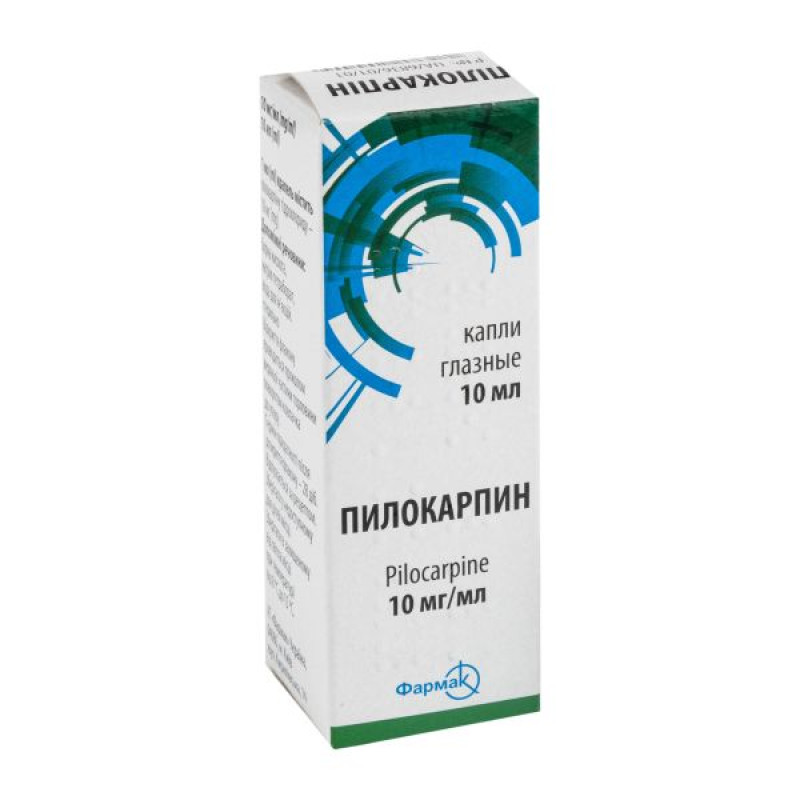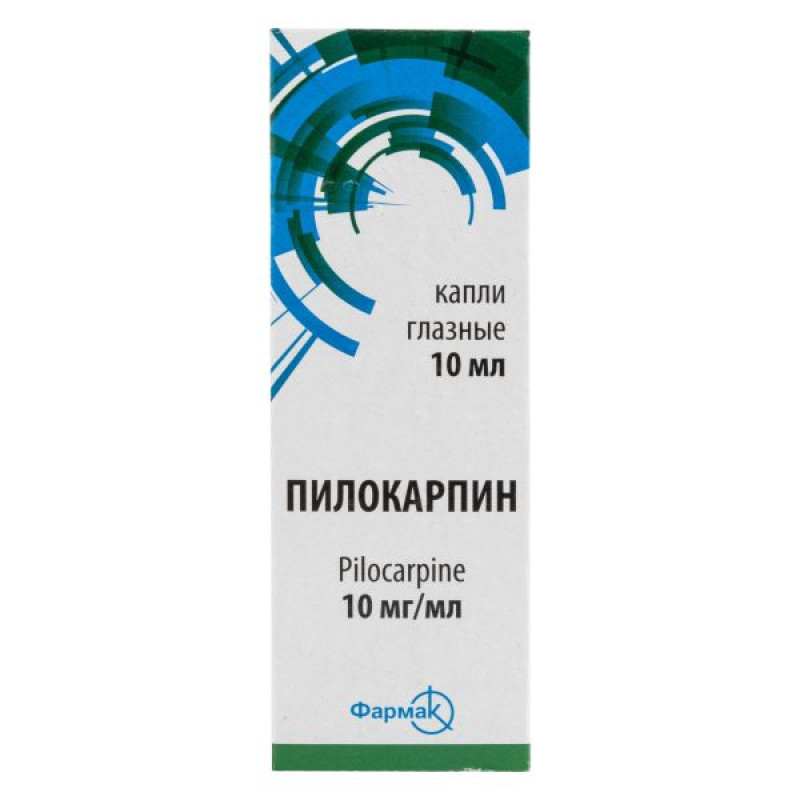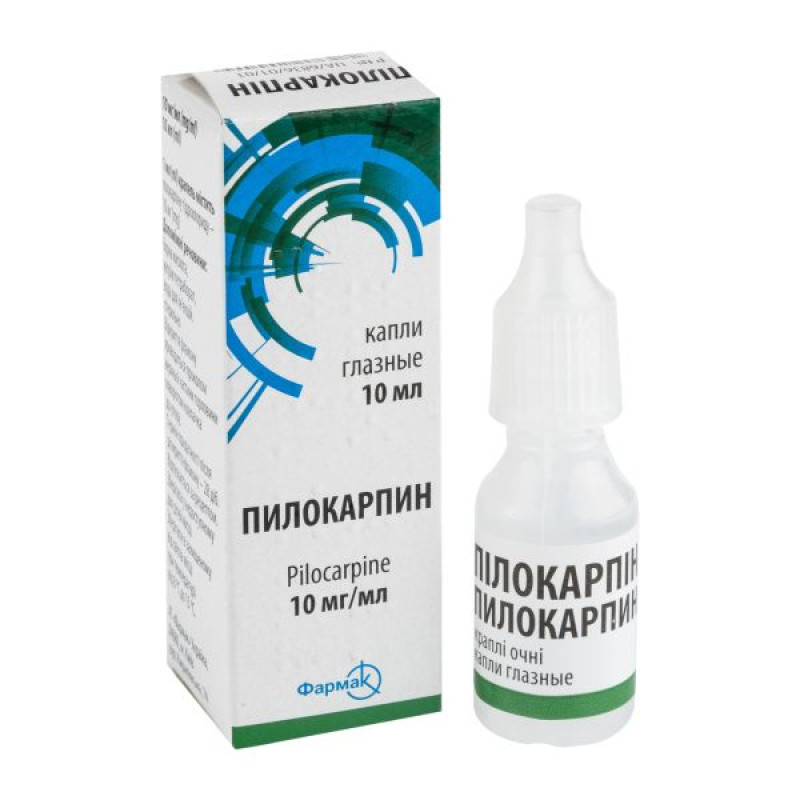Pilocarpine eye drops 1% bottle 10 ml

Instructions for use Pilocarpine eye drops 1% bottle 10 ml
Composition
active ingredient: pilocarpine;
1 ml of drops contains pilocarpine hydrochloride 10 mg;
excipients: boric acid, sodium tetraborate, water for injection.
Dosage form
Eye drops.
Main physicochemical properties: clear colorless liquid.
Pharmacotherapeutic group
Drugs used in ophthalmology. Antiglaucoma drugs and miotics. ATX code S01E B01.
Pharmacological properties
Pharmacodynamics
Pilocarpine hydrochloride belongs to the M-cholinomimetic agents. The mechanism of action is due to the excitation of peripheral M-cholin receptors, which causes contraction of the circular muscle of the iris and the ciliary muscle, accompanied by constriction of the pupil and opening of the angle of the anterior chamber of the eye, improving the outflow of intraocular fluid, which generally causes a decrease in intraocular pressure and improves trophic processes in the tissues of the eye. The decrease in ophthalmotonus reaches 3-4 mm Hg.
Pharmacokinetics
When instilled into the conjunctiva, pilocarpine hydrochloride penetrates through the cornea and is maximally concentrated in the aqueous humor of the eye after 30-40 minutes. The half-life from the eye is 1.5-2 hours, but the effect of the drug on the level of intraocular pressure lasts for 4-8 hours. Pilocarpine hydrochloride is not metabolized in the tissues of the eye, but is excreted with the intraocular fluid, inactivated by hydrolysis in the blood serum and liver. The half-life from blood plasma is 30 minutes.
Indication
Primary and chronic open-angle glaucoma. Acute attack of angle-closure glaucoma. Chronic angle-closure glaucoma (before surgery). Secondary glaucoma (as a result of central retinal vein thrombosis, acute retinal artery occlusion, optic nerve atrophy, retinal pigment degeneration, vitreous hemorrhage). The need for pupil constriction in case of overdose with mydriatics, for diagnostic purposes and during surgical interventions (except for people with high myopia).
Contraindication
Hypersensitivity to the components of the drug. Iritis, iridocyclitis, iridocyclitis crisis, uveitis, cyclitis, keratitis and other eye diseases in which pupil constriction is undesirable (after surgical interventions on the eye to prevent the occurrence of posterior synechiae), acute inflammatory diseases of the eye tissues, history of bronchial asthma; paradoxical reaction to the drug in chronic glaucoma.
Interaction with other medicinal products and other types of interactions
Antagonists of pilocarpine are atropine and other m-cholinoblockers. When used simultaneously with adrenostimulants, antagonism of action occurs (on the diameter of the pupil).
Timolol and phenylephrine enhance the reduction of intraocular pressure (reduce the production of intraocular fluid).
Possible use in combination with sympathomimetics, beta-blockers, carbonic anhydrase inhibitors.
M-cholinesterase activity is reduced by tricyclic antidepressants, phenothiazine derivatives, chlorprothixene, clozapine; it is enhanced by anticholinesterase drugs.
The effect of Pilocarpine may be enhanced by MAO inhibitors and antihistamines.
Bradycardia and decreased blood pressure may develop during general anesthesia with the use of flurotan (in patients using pilocarpine eye drops).
Application features
Before starting therapy, it is necessary to conduct a fundus examination.
The drug should be used with caution in patients with a history of retinal detachment, young patients with high myopia.
Immediately before use, hold the bottle with the drug in the palm of your hand to warm it to body temperature. Unscrew the cap, remove it and, slightly pressing on the bottle body, drip the solution into the eye. After instillation, screw the cap tightly.
Miotic agents should be prescribed in the absence of newly formed vessels in the iris.
Increasing the concentration and frequency of instillation (6 or more) is inappropriate, because it does not lead to an increase in the hypotensive effect and causes general negative reactions of the body.
Pilocarpine hydrochloride has practically no effect on the level of ophthalmotonus in healthy people, but is effective in patients with glaucoma of various forms. It is advisable to replace Pilocarpine with other non-miotic drugs for 1-3 months during the year. With prolonged instillation, miosis persists all the time, which is important for elderly patients with phacosclerosis and cataracts in the initial stage.
When using other eye drops simultaneously, the interval between instillations should be at least 15 minutes.
Use with caution in the following conditions:
acute heart failure; severe bradycardia; hypotension/hypertension; hyperthyroidism; epilepsy; peptic ulcer; urinary tract obstruction; vasomotor instability; Parkinson's disease; and patients who have recently had a myocardial infarction.
Ability to influence reaction speed when driving vehicles or other mechanisms
When using the drug, it is not recommended to drive vehicles and engage in other potentially dangerous activities that require clear vision.
Use during pregnancy or breastfeeding
Use during pregnancy or breastfeeding is possible only if, in the opinion of the doctor, the expected effect outweighs the risk of possible adverse reactions.
Method of administration and doses
Pilocarpine is instilled into each eye 1-2 drops 2-4 times a day. The daily dose and duration of treatment are determined by the doctor depending on the level of intraocular pressure. If necessary, the drug can be combined with β-adrenergic blockers.
In acute attacks of angle-closure glaucoma, Pilocarpine should be administered: during the first hour - 1 drop every 15 minutes; during 2-3 hours - 1 drop every 30 minutes; during 4-6 hours - 1 drop every 60 minutes; then - 3-6 times a day until the attack stops.
Children
Do not apply.
Overdose
Symptoms: nausea, bradycardia, persistent miosis, eye pain, visual impairment, headache may develop.
Treatment: if these symptoms appear, discontinue the drug. The specific antidote is atropine.
Atropine, tropicamide can be used as specific antidotes. In case of severe bradycardia due to overdose of parasympathomimetics, administer 0.5-2 mg of atropine parenterally. Treatment is symptomatic.
Adverse reactions
On the part of the organs of vision: discomfort and burning in the eye; miosis; accommodation spasm as a result of persistent miosis (at night); decreased visual acuity; short-term pain in the eye; redness; increased tearing; allergic conjunctivitis and dermatitis of the eyelid skin; spasm of the ciliary muscle; superficial keratitis; retinal detachment; itching in the eye area; myopia; photophobia; conjunctival hyperemia; corneal edema and erosion; increased pupillary block; vitreous hemorrhage. Long-term treatment can lead to follicular conjunctivitis, contact dermatitis of the eyelids, keratopathy, cataracts, reversible lens opacity, and changes in conjunctival tissue.
Nervous system: headache in the temples and paraorbital areas, tremor, dizziness.
Gastrointestinal: hypersalivation, nausea, vomiting, diarrhea.
Cardiovascular system: increased blood pressure, hypotension, bradycardia, changes in heart rhythm, vascular disorders.
Skin: increased sweating.
Respiratory, thoracic and mediastinal disorders: bronchospasm, pulmonary edema, rhinorrhea.
When using systems with prolonged drug release, tolerance develops.
Expiration date
3 years. After opening the bottle, the drug is suitable for 28 days.
Do not use the drug after the expiration date indicated on the package.
Storage conditions
Store in a place protected from light at a temperature of 8 ° C to 15 ° C. Keep out of the reach of children.
Packaging
10 ml in a bottle. 1 bottle in a pack.
Vacation category
According to the recipe.
Producer
JSC "Farmak".
Location of the manufacturer and its business address
Ukraine, 04080, Kyiv, Kyrylivska St., 74.
There are no reviews for this product.
There are no reviews for this product, be the first to leave your review.
No questions about this product, be the first and ask your question.









